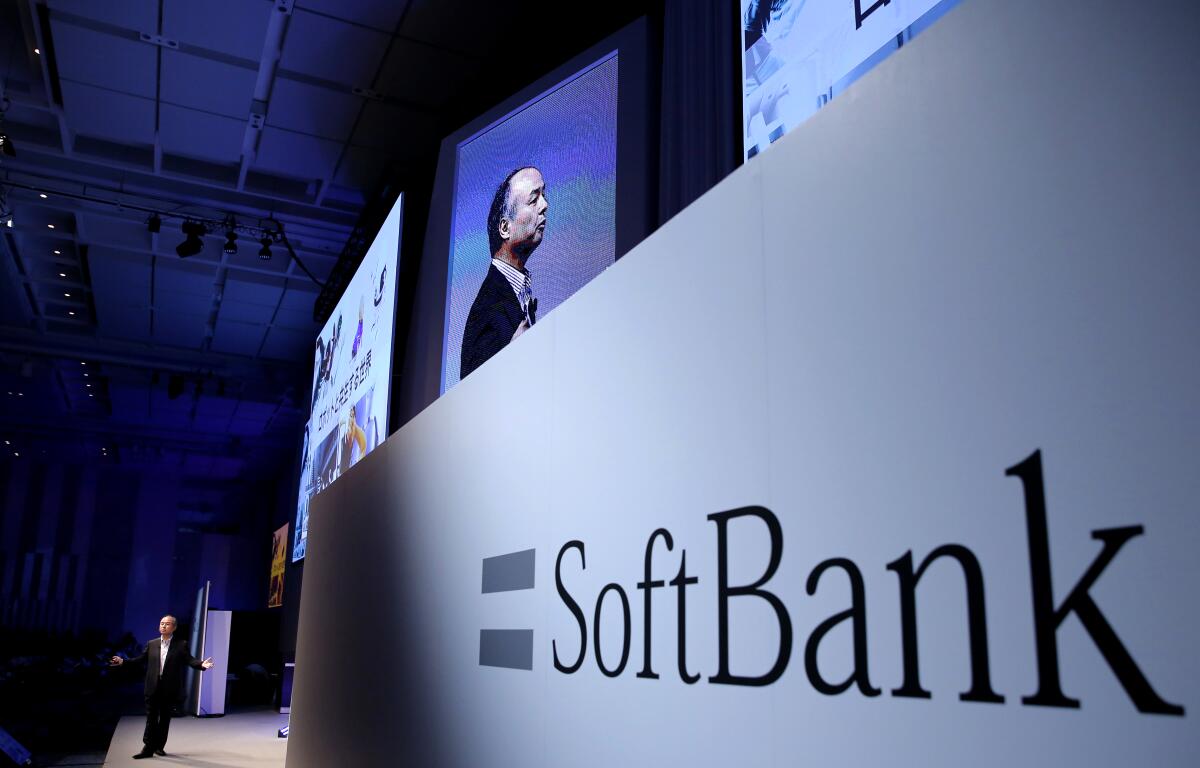Paul Singer and Masayoshi Son seem to be playing nice — for now

- Share via
Paul Singer earned his reputation as a take-no-prisoners brawler by challenging the interests of Argentina’s government and South Korea’s chaebol. With his latest investment, though, the American activist appears to be taking a more collaborative approach.
Singer’s Elliott Management Corp. took a stake of almost $3 billion in SoftBank Group Corp., saying the Japanese company’s shares are woefully undervalued compared with its assets. That’s exactly the argument SoftBank founder Masayoshi Son has been making for years.
Indeed, SoftBank has taken to posting a daily calculation online of what its shares are worth compared with their price, based on its holdings in Alibaba Group Holding Ltd., Sprint Corp. and others. The company’s own sum-of-parts calculation puts its total value at 12,259 yen a share ($111). That’s more than twice SoftBank’s actual share price, which values the company at about $96 billion. Elliott thinks SoftBank’s net asset value could be about $230 billion, people familiar with the discussions have said.
The New York-based hedge fund and SoftBank’s leadership have held cordial discussions, according to people familiar with the matter, perhaps because some of their interests are aligned. Indeed, news of Elliott’s stake popped SoftBank’s market value by more than $6 billion, and lifted the value of Son’s stock by more than $1 billion. The value of Elliott’s stake rose too, of course.
SoftBank may not go along with everything that Singer is seeking. But their interests may be more similar than they first seemed. As SoftBank prepares to report financial results on Wednesday, here are the issues at play:
Buyback
Elliott wants SoftBank to buy back shares because of their discount, arguing it could spend as much as $20 billion by trimming investments in companies such as Alibaba, Sprint and others. Son seems likely to accommodate at some point, though the amount may be much smaller. He has already unveiled repurchases with February earnings twice in the past — one for $5.5 billion last year and another for $4.4 billion in 2016.
“There was a pretty good chance of another share buyback in 2020, even before Elliott’s involvement,” said Atul Goyal, an analyst at Jefferies Group. “Given the persistent discount, it was only a matter of time before SoftBank got targeted by an activist.”
Alibaba shares surged 55% last year, far outstripping SoftBank’s 30% gain. The “decoupling” prompted Goyal to speculate that another buyback is imminent. Son has shown increasing willingness to part with stock in his most successful investment to date, including putting up $9.5 billion of Alibaba shares as collateral for margin loans under conditions that suggest he has no intention of getting them back, Goyal wrote in a report dated Dec. 9.
Board diversity
Elliott isn’t seeking any board seats at SoftBank, but wants the company to boost independence and diversity on its board, the people said. At most, only two of the 11 directors are independent and all are male, they said. At the last earnings call in November, Son said he was committed to improving corporate governance. A person familiar with the matter said the company was seeking independent board members.
Investment oversight
Elliott also wants SoftBank to set up a special committee to review the investment process at its $100-billion Vision Fund, which it thinks has dragged on the share price despite making up a small portion of assets under management, the people said. Son isn’t likely to give up his control; indeed, he is the only “key man” at the fund. But SoftBank recently approved new governance standards for its portfolio companies and investment guidelines, a step toward more accountability.
“A buyback is a near-term catalyst for the share price,” said Justin Tang, head of Asian Research at United First Partners. “A more enduring catalyst in our view is increased Elliott involvement in SoftBank’s investment decision making and a restructuring of its debt which is costing billions in interest payments.”
Transparency
Elliott also wants greater transparency around the Vision Fund, which discloses the names of its investments but not the size of the stakes or the valuation at which they were made, the people said.
SoftBank itself had recognized the need for more oversight as early as 2018 when it charged Chief Operating Officer Marcelo Claure with improving operations across portfolio companies. Claure, who led the Sprint turnaround, spent months assembling a team of about 40 executives. In the end, he was forced to cede control of the so-called SoftBank Operating Group to the man it was supposed to be overseeing — Rajeev Misra, the head of the Vision Fund.
“More disclosure on Vision Fund would be good, but in the end it comes down to trust and track record — listing the investments and getting independent valuations,” said Dan Baker, an analyst at Morningstar Investment Management Asia Ltd. “Any reduction in power and control for Son would likely be hard for him to swallow.”
The real boost to SoftBank’s shares would be if Elliott convinced Son to gradually wind down the Vision Fund altogether, Baker said. But there is little sign Son would go along. The Japanese billionaire seemed undeterred by the poor market reception of marquee investments, including Uber Technologies Inc., and the implosion of WeWork. As recently as November, Son said he still plans to raise another massive investment fund.
“The interests of SoftBank and Elliott are aligned when it comes to wanting the shares price to rise,” said Mitsushige Akino, an executive officer at Ichiyoshi Asset Management Co. in Tokyo. “But Son’s management style is looking 10 to 20 years ahead. That’s where you may see tension.”
More to Read
Inside the business of entertainment
The Wide Shot brings you news, analysis and insights on everything from streaming wars to production — and what it all means for the future.
You may occasionally receive promotional content from the Los Angeles Times.










